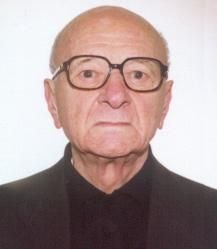Daniel Comboni
Comboni Missionaries
Institutional area
Other links
Newsletter
In Pace Christi
Negri Carlo
Fr. Carlo Negri was born at Trovo (Pavia) on 7 February, 1921, the first of nine children of a rather poor family. When he was ten he entered the diocesan seminary. In 1936, when he was in secondary school, Fr. Pietro Vai, a young Comboni missionary, returned from the missions. He, too, was from Trovo. He was worn out after six years of missionary work in Sudan (he actually died nine years later, at the early age of 36). Carlo felt that the Lord was calling him to take his place and so to become a missionary. He spoke to his spiritual director but his answer was late in coming, while the superiors encouraged him to continue with his studies in the diocesan seminary. So, on 15 August, 1943, he was ordained priest by the new bishop at Trovo church with a papal dispensation, since he was still only 22. At last, after working hard in the parish he had been sent, he joined the Comboni Missionaries at Venegono. He took his first vows on 15 August, 1946 and, a few months afterwards he left, with eighteen confreres, for Sudan where he worked in the missions of Bussere, Mboro and Deim-Zubeir.
It was then that, for him, began the missionary work, aimed especially at rendering the living conditions of those tribes more “human”. The mission grew with the school, the study centre, health assistance, catechism, conversions and baptisms. Within a few years it was flourishing.
In 1957, Fr. Carlo was recalled to Italy for two years of work in mission promotion, first at Riccione and then at Pesaro.
Meanwhile, with the coming of independence in Sudan in 1956, pressure from the government against the black populations of the south was growing and the political situation was deteriorating. In 1959, Fr. Carlo was again invited to go to Sudan.
He was first sent for ministry to the parish of Wau and again to the mission of Mboro. In 1960 the expulsions began and thus ended his missionary experience in Sudan.
Back in Italy, he was superior of the community of Crema for just over a year when, in September 1965, he was sent to Spain. This period may be divided into two periods: the first – lasting eleven years – was taken up with his work in founding the Comboni Province; the second – a much longer period of twenty six years – saw him dedicated to the mission promotion of the enclosed convents.
In the first period, he spent the first two years, accompanied by a Spanish confrere, visiting all the major and minor seminaries of the country which then had a great number of seminarians. Many of them entered the Comboni Institute. For the next nine years he was bursar, first in the Iberian Province (Spain and Portugal together) and then in the Province of Spain as the General Chapter of 1069 had created two separate provinces. In Spain it was an era of building: in April, 1967, the novitiate at Moncada and the house in Madrid were opened; in October, 1968, a house was bought in Barcellona a part for the brothers was added; later, work was begun on the construction of a minor seminary at Santiago and a scholasticate at Granada.
The second period began in 1975, when all the building work was completed. Fr. Carlo gave up the job of bursar to dedicate himself exclusively to visiting enclosed convents to ask for prayers for the missions and the missionaries, convinced, as he was, that “contemplative life is the soul of the mission”. In 2004, for health reasons, among others, he was assigned to the Italian Province and went to Rebbio di Como, the then community for elderly confreres, where he died on 14 March, 2013.
Da Mccj Bulletin n. 258 suppl. In Memoriam, gennaio 2014, pp. 37-46.

